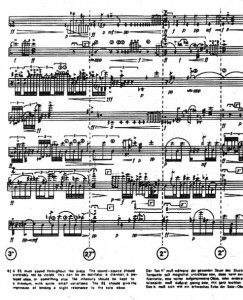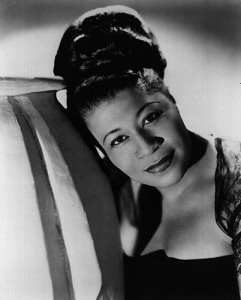Today’s picks come from Mira, and I am starting to notice that she is drawn to wider, more colorful packaging. I guess this means box sets will be ripped first.
The Berio recording I ripped tonight is the ‘complete’ Berio Sequenzas released on DG in 1998 (and I put the quote around complete because Berio composed a couple more after this). I had very little contact with Berio before coming to the University of Washington for grad school, and I was sent to Berio’s scores and recordings of performances of his music early on in my masters degree. I was beginning work on a piece for solo viola, and Richard Karpen scolded me for even thinking about composing works for a solo instrument without knowing these pieces. I wouldn’t be surprised even if he told me that I shouldn’t think about being a composer without knowing these pieces. But it is sufficient to say that I learned quickly that there were some serious holes in my knowledge of repertoire. Berio has become one of my favorite composers. I remember finding the Sequenzas quite uneven on my first listening to these performances (and still find some of these recordings flat). Studying the scores however was like looking at an encyclopedia of extended techniques for each instrument that he composed for. One of my most important lessons about music in general came from further listenings of these pieces. I was amazed how different performances could be, and I came to see the performance of new music not necessarily as a striving for a note perfect representation of dots on a page (where it was the responsibility of the composer to hyper-notate every nuance that is wanted) but as a relationship between composer, performer, performance history and performance practice. These pieces greatly changed how I viewed my role in the world as a composer, and this outlook still changes with every performance I have and piece I write. These pieces also taught me about how important the theatrical performance of a work is. While I have found recordings of these pieces that I enjoy listening to (there will be more writings about the Sequenzas here while the project goes on), seeing them performed (even rehearsed) adds so much to the listening of them. Seeing how a performer grapples with the technical and musical demands of this music is exhilarating.
Ella Fitzgerald’s ‘songbook’ collections came out on Verve first in the 50s and 60s on LP and were reissued on CD in the late 90s. A quick search on Wikipedia (to grab the above dates) also revealed that in 2000 this ALBUM was inducted into the Grammy Hall of Fame, and in 2003 the Library of Congress chose it as one of 50 recordings added to the National Recording Registry. To call this album a treasure is an understatement. It is one of the most beautifully compiled set of performances I think I own. I have played this music while closing the record store for the night, I have played tracks from it for my music theory students, and I have played it just about anytime I need something to lighten me up a bit. Personally, I believe these recordings were captured near the peak of Ella Fitzgerald’s career (along with the ‘Cote d’Azur’ recordings that were done with Duke Ellington). Her musicality is startling, and she may be one of the most perfect interpreters of Cole Porter’s music that I can think of. Her voice on ‘Miss Otis Regrets’ embodies the complexity of the story told in the lyrics, full of sorrow and relief at the same time. ‘You Do Something To Me’ and ‘Too Darn Hot’ embody what I imagine Manhattan sexy in the 50s must have been. But it is her version of ‘I Love Paris’ that is probably one of the top 10 songs that I get stuck in my head. Buddy Bergman’s orchestral arrangement does more the compliment Ella’s voice. This song achieves a stunning relationship between the singer and her accompaniment, rising well above a sum of the two parts. Having such a clear image of this song in my head is one of my most treasured musical memories.



